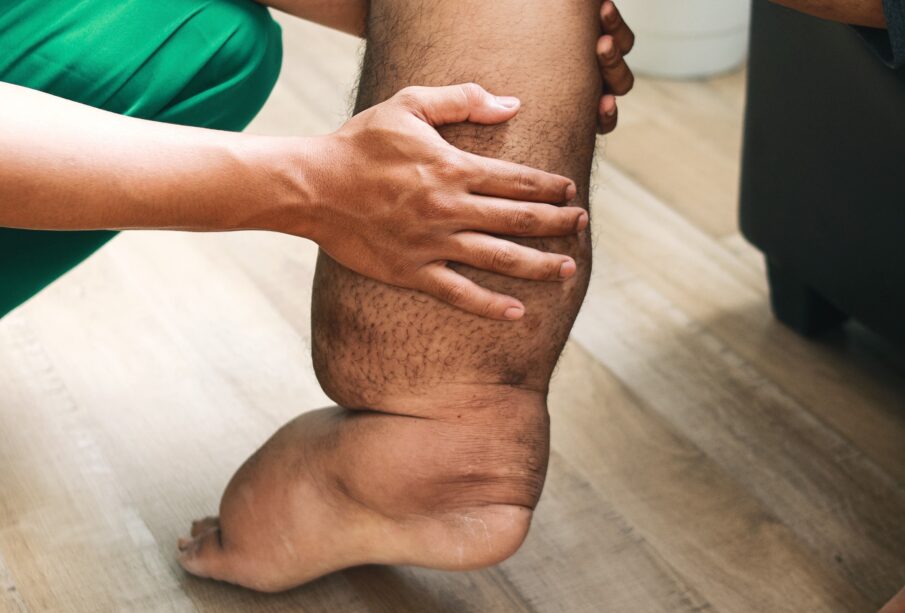Lymphatic Filariasis Treatments: 4 Simple Solutions

Imagine waking up one day to find your leg or arm painfully swollen, with the simple act of walking or even moving becoming a daily struggle.
This is the harsh reality for millions suffering from Lymphatic Filariasis, also known as Elephantiasis. It is a disease caused by tiny parasitic worms, but its impact is anything but small.
The good news? There are treatments that can stop this disease in its tracks and bring relief to those affected.
In this article, we will learn about simple and effective lymphatic filariasis treatments. These treatments can help to reduce symptoms, prevent the disease from spreading, and improve the quality of life for those affected.
Common Lymphatic Filariasis Treatments
Lymphatic filariasis occurs when tiny worms called filarial worms invade the lymphatic system, which is part of the body’s immune system.
Over time, this can cause severe swelling, especially in the legs, arms, breasts, and genitals. The disease can be painful and disabling. However, with the right treatments, it is possible to manage and prevent lymphatic filariasis.
The common treatments involve:
1. Medications to Kill Parasites
The primary treatment for lymphatic filariasis is medication. The goal of these drugs is to kill the filarial worms and stop the spread of the infection.
Ivermectin
Ivermectin, present in medicines like Ivecop, is an important medicine used in the treatment of lymphatic filariasis. It kills the microfilariae (young worms) in the blood, which helps reduce the number of worms in the body. It is often combined with DEC and Albendazole.
Diethylcarbamazine (DEC)
Diethylcarbamazine (DEC) is used in the treatment of lymphatic filariasis. It works by killing the larvae (young worms) in the blood, preventing them from developing into adult worms. DEC is usually given once a year in areas where the disease is common.
Albendazole
Albendazole is another medication used to treat lymphatic filariasis. It is often given in combination with DEC or Ivermectin (another antiparasitic drug).
You can safely buy Ivecop and its substitutes containing Ivermectin from trusted online pharmacies like Cheap Medicine Shop
2. Managing Symptoms and Complications
While medications can kill the worms, they do not reverse the damage already caused by the condition.
Lymphatic filariasis can cause long-term swelling, pain, and disability. Managing these symptoms is an important part of treatment.
a. Hygiene
Proper hygiene is essential for people with lymphatic filariasis. The swelling caused by the disease can make the skin more prone to infections.
Regular washing with soap, drying the skin thoroughly, and applying moisturizers can help reduce the risk of infections and improve the health of the skin.
Wearing comfortable, loose clothing can also prevent irritation and promote better circulation in the affected areas.
b. Exercise and Elevation
Some exercises can help reduce swelling in the limbs. Gentle movements, such as stretching and bending the limbs, can improve blood flow and help the lymphatic system drain excess fluid.
Elevating the affected limbs while resting can also help reduce swelling.
c. Compression Therapy
Compression bandages or stockings can help control swelling by providing gentle pressure on the affected limbs. These special garments help to push the excess fluid out of the swollen areas and prevent further buildup. People with lymphatic filariasis should consult a healthcare provider to get the right type of compression therapy for their condition.
d. Treatment of Secondary Infections
Because the swelling caused by lymphatic filariasis can make the skin more vulnerable to infections, it is important to treat any secondary infections quickly.
Antibiotics may be prescribed if there are signs of a bacterial infection. In severe cases, hospitalization may be needed to control the infection.
3. Surgical Treatments
In some cases, surgery may be needed to treat the complications of lymphatic filariasis. Surgery can help remove excess tissue caused by long-term swelling and improve the appearance and function of the affected areas.
4. Preventing the Spread of Lymphatic Filariasis
Prevention is an important part of managing lymphatic filariasis. The disease is spread by mosquitoes carrying the filarial worms. Reducing mosquito exposure can help prevent new infections.
This includes using mosquito nets, applying insect repellents, and wearing full sleeves and pants to avoid mosquito bites.
Conclusion
Lymphatic filariasis is a serious disease that can cause long-term disability and suffering. However, with the right treatment and care, it is possible to manage the disease and prevent its spread.
Lymphatic filariasis treatments include medications like DEC, Albendazole, and Ivermectin are effective at killing the worms and stopping the infection. Proper hygiene, skincare, and exercise can help reduce swelling and prevent complications. In some cases, surgery may be needed to correct severe damage caused by the disease.
Preventing the spread of lymphatic filariasis through mosquito control is also essential.














